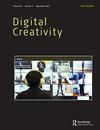Artificial intelligence as relational artifacts in creative learning
IF 2.7
4区 艺术学
0 ART
引用次数: 0
Abstract
ABSTRACT Artificial Intelligence (AI) has significantly advanced in creating professional-level media content. In creative education, determining how students can benefit without becoming dependent on them is a challenge. In this study, researchers conducted an exploratory experiment that positioned AI as a relational artifact to students in a series of drawing activities and examined the potential impact of affective relations with machines in socio-cultural creative learning. The resulting artifacts, observations, and interview transcripts were analyzed using the Consensual Assessment Technique and a grounded theory approach. The study's results indicate that the design professors reliably evaluated the student drawings as more creative than the AI drawings, but neither demonstrated a consistent increase in creativity. However, the presence of AI engaged the students to explore different approaches to artistic prompts. We theorize that AI can be mediated as a learning artifact for transformative creativity if the students perceive their relationship with AI as empathetic and collaborative.人工智能作为创造性学习中的关系人工制品
人工智能(AI)在创造专业级媒体内容方面取得了显著进展。在创造性教育中,如何让学生在不依赖他们的情况下受益是一个挑战。在这项研究中,研究人员进行了一项探索性实验,将人工智能定位为一系列绘画活动中与学生相关的人工制品,并研究了与机器的情感关系在社会文化创造性学习中的潜在影响。由此产生的伪影、观察结果和访谈记录使用共识评估技术和扎根理论方法进行分析。研究结果表明,设计学教授确实认为学生的画比人工智能的画更有创意,但两者都没有显示出创造力的持续增长。然而,人工智能的存在促使学生探索不同的艺术提示方法。我们的理论是,如果学生认为他们与人工智能的关系是移情和协作的,那么人工智能可以作为一种学习人工制品来调解,以实现变革性的创造力。
本文章由计算机程序翻译,如有差异,请以英文原文为准。
求助全文
约1分钟内获得全文
求助全文
来源期刊

DIGITAL CREATIVITY
ART-
CiteScore
3.10
自引率
9.10%
发文量
19
期刊介绍:
Digital Creativity is a major peer-reviewed journal at the intersection of the creative arts, design and digital technologies. It publishes articles of interest to those involved in the practical task and theoretical aspects of making or using digital media in creative disciplines. These include but are not limited to visual arts, interaction design, physical computing and making, computational materials, textile and fashion design, filmmaking and animation, game design, music, dance, drama, architecture and urban design. The following list, while not exhaustive, indicates a range of topics that fall within the scope of the journal: * New insights through the use of digital media in the creative process * The relationships between practice, research and technology * The design and making of digital artefacts and environments * Interaction relationships between digital media and audience / public * Everyday experience with digital design and artwork * Aspects of digital media and storytelling * Theoretical concepts
 求助内容:
求助内容: 应助结果提醒方式:
应助结果提醒方式:


